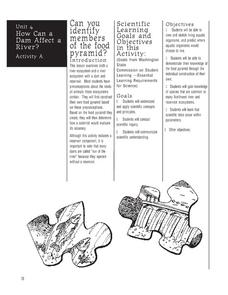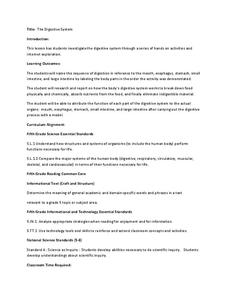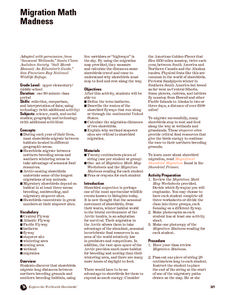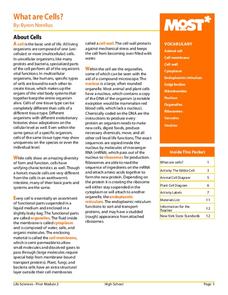Foundation for Water & Energy Education
How Can a Dam Affect a River? Activity A
Written for Washington state students in life science, this lesson provides an opportunity to examine the residents of local freshwater habitats. You or the class collects a water sample, and learners try to examine what organisms live...
Curated OER
Dining Out With Fishes and Birds of the Hudson
While this instructional activity focuses on the birds and fish found on the Hudson River, it could be adapted for use in any classroom. Using a vocabulary list, learners explore the meaning of words like adaptation, habitat, barbel, and...
Curated OER
The Digestive System
Discover how the human body's digestive system works with a brain and stomach friendly activity. Scholars taste test a variety of foods to find out how they behave once in the mouth. Class members then play a game called Move That...
Curated OER
Chemistry of Food
In this chemistry of food learning exercise, students complete 20 various types of questions related to food and nutrition. First, they complete a crossword puzzle with vocabulary terms. Then, students use the figure shown to write the...
Curated OER
Microbes and Our Food
Students investigate foodborne illnesses and involved microbes. They identify major pathogens and then research and explain how they contaminate foods and how people are affected.
Core Knowledge Foundation
Ecology Tell It Again!™ Read-Aloud Anthology
A read-aloud anthology provides informational texts about ecology to boost reading comprehension. Third-graders listen and discuss readings where they answer questions and focus on vocabulary. Pupils complete extension activities,...
Curated OER
Food Chains
Young scholars create their own food chains on Kidspiration starting from the energy of the sun and what it creates. In this food chains lesson plan, students learn about how insects eat plants and so on.
Salt River Project
How Do We Clean Polluted Water?
How do we clean up oil spills and other pollutants in the water? Explore water treatment strategies with a set of environmental science experiments. Groups remove oil from water, work with wastewater treatment, and perform a water...
The Science Spot
Cells & Organelles
Familiarize young biologists with the inner workings of eukaryotic cells with this vocabulary worksheet. By cutting out and matching a series of definitions and memorization tips to the organelles listed in the provided table, students...
California State Parks
Energy Flow Through an Ecosystem
One of the key concepts in life science and biology is the cycling of energy throughout an ecosystem. Learners can take notes on the topic using the vocabulary included within the presentation. From producers making their own food...
Polar Trec
Bioaccumulation of Toxins
In 2015, Peter Cook found that sea lions with high levels of exposure to toxins suffered permanent brain damage if they survived at all. Scholars learn about the accumulation of toxins at various levels of the food chain. Using...
Polar Trec
Nature's Density Column
Nature provides density columns in the polar regions that provides food for many animals. Young scientists build their own density columns with water in order to answer analysis questions. Through a slideshow presentation, scholars...
SF Environment
Sort and Color!
Sorting is a very important skill that can be used in math and even science. Learners get familiar with some environmentally friendly vocabulary terms as they practice separating objects that can be recycled from those that can't. They...
Discovery Education
Motion in the Ocean
How do temperature changes affect ocean currents? Scholars explore convection currents by demonstrating the flow of water in a baking dish. They use ice, heat, and food coloring to see currents. Then, they draw conclusions about their...
Education Outside
Papermaking
Imagine recycling food scraps and using them to make paper. The directions are all here in a seven-page packet that details several paper-making strategies.
Prince William Network
Migration Math Madness
A great way to incorporate math into life science, this lesson has learners measure migratory routes on a map and calculate the actual distance that shorebirds on the routes would cover. Learners compute the distance covered in both...
Curated OER
Relative Age Dating
Modeling dough and paper cutouts in science class? Learn about how relative age dating concepts, like the Law of Superposition and cross-cutting relationships, can be used to describe the formation of sedimentary layers.
Oklahoma State University
Hairy Heredity
Young scholars learn that heredity comes down to the flip of a coin with this cross-curricular math and science lesson. Using smiley faces as a model, young scholars toss coins to determine which dominant or recessive traits will be...
Curated OER
What Are Cells?
Energize the cells of young biologists with an edible life science activity. Engaging students in exploring the inner workings of plant and animal cells, this activity involves using colored jello and various sweet and tasty treats to...
Curated OER
Hide and Seek Science
Students examine macro-invertebrates in order to better understand their link to the food web. Working in groups, they record observations of several areas of a stream or river, collect samples from the river bottom, and identify the...
Curated OER
Obtaining Food -- The Impact of Over-fishing
Students play a fishing game. In this food supply lesson students regulate their fishing in a game about over-fishing. The students identify resources that could be extracted from that biome.
Curated OER
Breaking the Food Chain
Students investigate the food chain. They brainstorm questions about the human food chain and explain what would happen to living things in the food chain if organisms or resources were removed. They role-play situations in which the...
Curated OER
The Effects of Pesticides on the Food Chain
Fourth graders generalize that all animals, including people, depend on plants as a food source. In this science lesson plan, 4th graders describe and construct a food chain, tell how pesticides enter the food chain, and discuss possible...
Curated OER
Biotechnology, GMOs and Food
Twelfth graders explore controversy around genetically modified foods, identify source of controversy, and role play town hall meeting on genetically modified foods, to examine viewpoints and arguments for and against genetic modification.

























